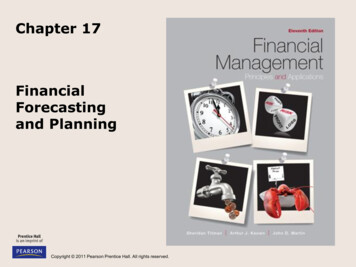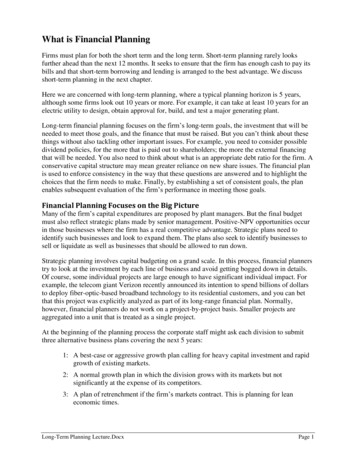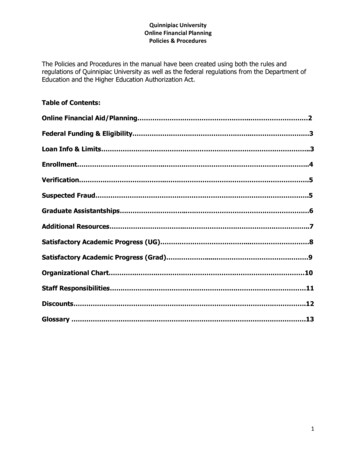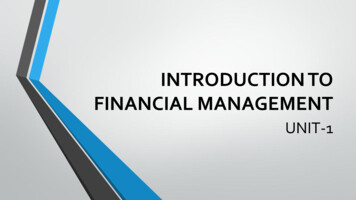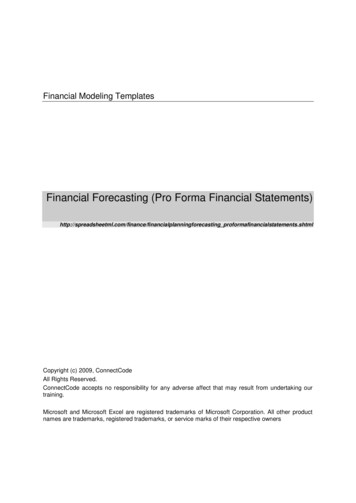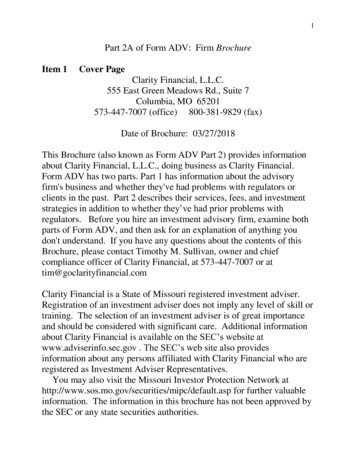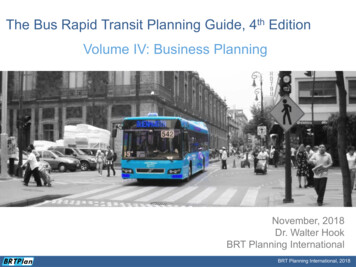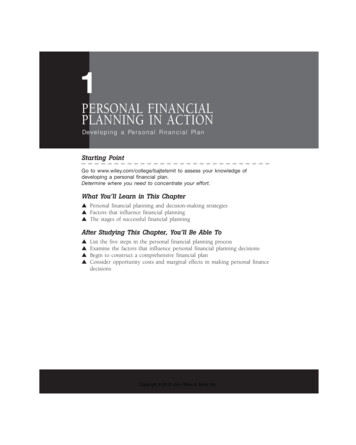
Transcription
FinancialPlanning andYour SmallBusiness FAMILY PLANNING EDUCATION INVESTMENT RETIREMENT SAVING EQUITY FAMILY PLANNING EDUCATION INVESTMENT RETIREMENT SAVING EQUITY FAMILY PLANNING EDUCATION INVESTMENT RETIREMENT SAVING EQUITY FAMILY PLANNING EDUCATION INVESTMENT RETIREMENT SAVING EQUITY FAMILY PLANNING EDUCATION INVESTMENT RETIREMENT SAVING EQUITY FAMILY PLANNING EDUCATION INVESTMENT RETIREMENT SAVING EQUITY FAMILY PLANNING EDUCATION INVESTMENT RETIREMENT SAVING EQUITY FAMILY PLANNING EDUCATION INVESTMENT RETIREMENT SAVING EQUITY FAMILY PLANNING EDUCATION INVESTMENT
WWW.PLANNERSEARCH.ORGSince 2000, the FinancialPlanning Association (FPA ) has been theprincipal professionalorganization for certifiedfinancial planner (CFP )professionals who seekadvancement in a growing,dynamic profession. FPAbelieves everyone canbenefit from the adviceof an experienced andqualified financial planner.To search for a CFP professionalplease visit www.PlannerSearch.orgor call FPA at 800-322-4237.
FINANCIAL PLANNING AND YOUR SMALL BUSINESSIt’s Your Business — and Your LifeIf you’re like most small business owners, yourpersonal life and business life are practicallyinseparable. That’s why it’s important for yourpersonal financial planning to take into accountthe unique considerations — and opportunities— of owning and operating a small business.This brochure can help you get started. It drawson the expertise of thousands of members of theFinancial Planning Association.
WWW.PLANNERSEARCH.ORGA ‘Big Picture’ ProcessFinancial planning is the process of wiselymanaging both your personal and businessfinances so that you can achieve your goals anddreams. You can do financial planning on yourown or with the assistance of a financial planner.Either way, it makes sense to follow a financialplanning process that includes: Setting realistic financial and personal goals Evaluating where you are now financially Developing a plan to reach your goals Putting your plan into action Monitoring your plan to stay on track withchanging goals and circumstancesFinancial Planning Takesa “Big Picture” ApproachExamine all areas of your finances — investments, taxplanning, insurance, retirement planning and estateplanning — in the context of your business to make surethey work together to achieve your goals.A Different Kind of Investment PlanSmall business owners frequently focus allof their investment money, including for theirretirement, on their own business. After all, it’sthe business they know best.The problem with investing solely in yourown business is one of risk, because for everyimmensely successful business, dozens moreeither fail or return only modestly. That’s whyfinancial planners typically counsel businessowners to diversify at least some of theirinvestment money. The following are afew suggestions: Start with a written investment planthat takes into account your business andwill keep your finances steady throughrough times.
FINANCIAL PLANNING AND YOUR SMALL BUSINESS Build a cash cushion for your family andyour business. Set aside at least three tosix months of cash flow (some plannersrecommend a year or more) in a liquidaccount, such as a money market fund. Resist the temptation to invest onlyin companies in your industry, or thosewith whom you do business. If yourindustry experiences a downturn, both yourbusiness and the stocks you’ve investedin could slump at the same time. Similarly,avoid investing only in the stock of smallcompanies or only in local real estate. To better diversify, planners commonlyrecommend balancing off your businessinvestment with large company,nonregional, domestic stocks, as well asinternational securities and perhaps realestate investment trusts that invest in otherregions and industries. Bonds are anotherimportant component of a diversifiedinvestment portfolio. Use your diversified portfolio as areceptacle account for harvesting cashflows from your business when they exceedyour current lifestyle needs. The exact mix of cash, bonds and stockdepends on your particular circumstances,age and tolerance for risk. The key is toremain diversified. Your business mayultimately provide all the money you need,but the other investments are there in casethat doesn’t happen.
WWW.PLANNERSEARCH.ORGTaking on DebtThe flip side of investing money is borrowing. Hereare a few considerations to keep in mind whenyour business has financing needs. Determine how much you’ll need. Thisentails developing a good business plan(see sidebar on page 5). Include in the plana break-even analysis, which estimatesthe amount of revenue the business mustgenerate to cover expenses before evena dime of profit is made. The analysis canhelp you determine the funding you need tosurvive until you reach — and exceed — thebreak-even point. Don’t be too conservative whenestimating your financing requirements.Some experts recommend adding10 percent to your estimate to coverunexpected needs. Weigh all your financing alternatives.Personal savings, loans from family orfriends, credit cards, commercial bankloans, personal bank loans, federallybacked loans or private investors. Eachchoice has pros and cons; think themthrough carefully. Arrange for credit sources in advance.Don’t wait until the last minute.
FINANCIAL PLANNING AND YOUR SMALL BUSINESSFocus on Tax PlanningTaxes are a fact of life for everyone, but for smallbusiness owners, the maze of tax regulationscan be especially daunting. A solution, say CFPprofessionals, is to think in terms of tax planning.Business ownership, in particular, provides afertile ground for tax planning.Tax planning is a year-round approach that isdone in the context of your overall financialpicture. The goal is to make sure that a giventax saving strategy won’t undermine your otherimportant financial goals.Take the decision of choosing a businessstructure, for example. Sole proprietorships,partnerships, S or C Corporations, and LLCs orLLPs have different income tax requirements andtax calculations. New laws might prompt you toconsider changing from one business structureto another to reduce your tax bite. While thiscould be a wise move, be sure to consider nontaxissues as well, such as how a new businessstructure will affect your ability to shield yourpersonal assets from business creditors, takedeductions for fringe benefits, and pass thebusiness to your heirs.In other words, don’t let the “tax tail wag thebusiness dog.”
WWW.PLANNERSEARCH.ORGHere are a few other tips from financial planners: Keep up on the basics of new taxlaws — newspapers, magazines and onlinesources provide a wealth of information. Expect your financial planner and/oraccountant to alert you to tax planningopportunities presented by changing lawsand regulations. Utilize a professional tax preparer. Look for areas in your business thatpresent tax savings opportunities, suchas saving in your company retirementaccount, timing income and expenses, andusing charitable gifting strategies. Be cautious about basing tax planning tooheavily on what you think future tax lawsmight be. The laws may never materialize.Ultimately, tax planning is less a goal in itself thana means to help achieve your other business andpersonal goals. Saving taxes should complement,not dominate, your financial life.
FINANCIAL PLANNING AND YOUR SMALL BUSINESSBusiness Plans and Business PlanningBusiness plans are a topic unto themselves andbeyond the scope of this brochure, but keep inmind that there are two basic types of business plans,which are distinguishable from each other by theirrespective purposes. “Money-raising” plans are designed expresslyto assist in obtaining debt or equity financing, forstart-up or expansion, by favorably impressingcommercial or investment bankers. “Operating” plans are more practical innature and have little or nothing to do withraising money; they are essentially a roadmapfor owners to create and reference in pursuingbusiness objectives.Before creating a business plan, be clear about itspurpose — that will guide both the plan’s content andits format.In addition, if you decide to work with a financialplanner to develop your business plan or your personalfinancial plan, look for a planner who understands bothbusiness planning and personal financial planning.Ideally, you want someone in your corner who canadvise you about the financial aspects of runninga business as well as guide your personal financialplanning decisions.
WWW.PLANNERSEARCH.ORGInsurance to Protect What You ValueAnother critical aspect of financial planning andyour small business is insurance — what kind, howmuch and at what cost. The following are a fewconsiderations to keep in mind: Liability insurance. The type of liabilityinsurance you need depends on theindustry you’re in, and liability laws areconstantly changing. Consult an insuranceprofessional for your specific needs.
FINANCIAL PLANNING AND YOUR SMALL BUSINESS Property insurance. Review your coverageto make sure it reflects recent buildingimprovements or additional property.Determine if the coverage will rebuild orrepair according to current building codes,and if it will cover replacement costs atcurrent prices, or only at a set limit ordepreciated value. Also learn what kindof disasters your insurance will — and willnot — cover. Consider whether inventorycoverage is appropriate for your situation. Business interruption insurance. Thisinsurance covers lost income and overheadexpenses when a business must temporarilyclose its doors due to a covered disaster. Life and disability insurance. Businessesfrequently provide this coverage toemployees as a fringe benefit. Smallbusiness owners also may need life anddisability insurance for business purposes,such as collateral for a loan, to fund abusiness succession plan or to mitigatethe loss of a key person. Workers’ compensation insurance. If abusiness employs three or more people,workers’ compensation insurance mustbe provided. Health insurance. Health insurancepremiums have become a major expensefor business owners, but there are ways tokeep costs under control and still offer thisimportant benefit to your employees (andyourself). One example: Establish a lessexpensive, high-deductible health plan andsupplement the plan with a tax-advantagedhealth savings account (HSA). An employee’scontributions to an HSA are tax deductible,and tax-free distributions can be used topay for current medical expenses or save forfuture health insurance premiums.
WWW.PLANNERSEARCH.ORGRemember Your Retirement“Too complicated and too expensive.” That’sthe response planners often hear from smallbusiness owners on the subject of companyretirement plans.The good news is that you have better optionstoday than you may realize. And the reality is,most business owners cannot afford not toestablish a retirement plan. Even if you assumethat you’ll easily sell your business when youretire and live on the proceeds, it’s risky toassume that it will work out that way.The plan you choose depends on many factors,including the number of employees you have andwhether you want to help them with retirement;how long you have before your own retirement;your tax situation; what you currently have savedfor retirement; and how much money you’ll needfor the retirement you envision.A wide array of plans are available to smallbusiness owners: traditional defined benefitpension plans, 401(k) plans, profit-sharing,Simplified Employee Pension Plans (SEP) andSavings Incentive Match Plan for Employees(SIMPLE) are among them. Your financial plannercan help you analyze the options to determinewhich plan is best for your situation.For example, a 401(k) plan may cost moreto administer than a SEP or SIMPLE, but italso provides more liability protection for theowner’s assets. A SEP is easy and inexpensiveto establish and maintain, but owners must fundcontributions for eligible employees at the samerate they fund their own accounts. In contrast,employees are responsible for funding theirSIMPLE accounts, but the owner must matchemployee contributions up to 3 percent of theemployee’s pay or contribute up to 2 percent forevery eligible employee.No matter which plan you and your financialplanner choose, start your retirement plan assoon as possible. In the early years of yourbusiness, cash flow may not be on your side,but time is. Take advantage of it.
FINANCIAL PLANNING AND YOUR SMALL BUSINESSA Retirement Plan Can AccomplishSeveral ObjectivesIt can enable you to: Put away money for retirement Save on taxes Provide a benefit to employeesBusiness Succession PlanningEstate planning — and more specifically, businesssuccession planning — is essential for anyonewho owns a small business because typicallythe business is the largest asset in the owner’sestate. This is not just a tax issue. Withoutbusiness succession planning, it’s unlikely thatyour business will survive to the next generationor sell for its true value. This assumes, of course,that succession or sale is a goal.Here are six business succession planningmistakes to avoid. Waiting too long to plan. An idealsuccession plan requires laying thegroundwork over many years — some expertsrecommend planning your exit strategy fromthe day you start the business. How youwant to exit the business tomorrow stronglyinfluences how you structure and operatethe business today. Assuming the children will take overthe business. Talk to your children todetermine what they really want. Learntheir desires as soon as possible in order topursue other avenues if necessary, such asselling to an employee or partner or findingan outside buyer.
WWW.PLANNERSEARCH.ORG Dividing the business equally amongheirs. Equitable doesn’t have to meanequal, and in the case of a business,establishing an equal partnership amongheirs can be a recipe for disaster. As analternative, determine which child hasthe talent and genuine desire to run yourbusiness, and plan a way to leave yourother children nonbusiness assets, such asproceeds from life insurance. Overlooking the possibility of a disability.Most business succession plans addressthe owner’s retirement or premature death,but may overlook the possibility that thebusiness owner could become disabled andno longer able to run the business. A goodsuccession plan addresses this possibility. Failing to fund the succession plan. Ifyour plan is to sell your business to a familymember, partner, employee or outsidebuyer at your death, disability or retirement,how will they come up with the funds topurchase the business? Loans and cashare two options, but also analyze the prosand cons of using life and disability buyoutinsurance to fund a succession plan. Planning alone. Business successionplanning is complicated. The tax issuesalone should send you to an expert foradvice. In addition, consider working with anoutside expert who can lead family meetingsand ease family conflicts by providing aknowedgeable, objective perspective.
FINANCIAL PLANNING AND YOUR SMALL BUSINESS 2015 Financial Planning AssociationThe Financial Planning Association is the owner of trademark, service mark and collectivemembership mark rights in: FPA, and FINANCIAL PLANNING ASSOCIATION. The marksmay not be used without written permission from the Financial Planning Association.CFP and CERTIFIED FINANCIAL PLANNER are certification marks owned by CertifiedFinancial Planner Board of Standards, Inc. These marks are awarded to individuals whosuccessfully complete CFP Board’s initial and ongoing certification requirements.The Financial Planning Association is the owner of trademark and service mark rights inFinancial Planning Week and the FINANCIAL PLANNING WEEK/LOGO. The marks may not beused without written permission from the Financial Planning Association.The content in this material is believed to be current as of this printing, but, over time,legislative and regulatory changes, as well as new developments, may date this material.
To search for a CFP professionalplease visit www.PlannerSearch.orgor call FPA at 800-322-4237.
Financial planning is the process of wisely . managing both your personal and business finances so that you can achieve your goals and dreams. You can do financial planning on your own or with the assistance of a financial planner. Either way, it makes sense to follow a
